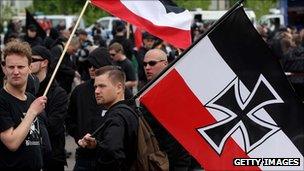Germany bans neo-Nazi group aiding far-right prisoners
- Published

Germany is determined to crack down on its neo-Nazi groups
Germany has banned its biggest neo-Nazi association, the HNG, which supports far-right prisoners in German jails.
The Interior Ministry said the group, with its racist, anti-Semitic agenda, was a threat to German society and the constitution.
The ban is the latest step by the government to curb the influence of far-right groups.
It follows raids last year when the police seized material from HNG members across Germany.
The HNG, or Help Organisation for National Political Prisoners and Their Families, was founded in 1979 and is thought to have about 600 members.
It calls itself a charity and helps those who have been imprisoned for their ultra right-wing views.
Its opponents say it also propagates those views in prisons.
"It is no longer acceptable that imprisoned right-wing extremists are being strengthened in their aggressive stance against the free, democratic order," the German Interior Minister, Hans-Peter Friedrich, said in a statement.
The organisation gave support to far-right prisoners who were "rejecting the democratic constitutional state and glorifying National Socialism", said the ministry.
The BBC's Steve Evans in Berlin says it is not clear what effect the banning of such groups has had.
There is a far right in Germany as in other European countries, and it has won a few seats in some regional legislatures - but it has never got anywhere near a majority.
- Published5 September 2011
- Published22 June 2010